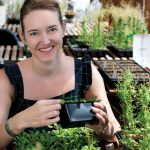Salk’s Harnessing Plants Initiative (HPI) received $30 million from the Bezos Earth Fund to advance efforts to increase the ability of crop plants, such as corn and soybeans, to capture and store atmospheric carbon via their roots in the soil. This work will explore carbon-sequestration mechanisms in six of the world’s most prevalent crop species with the goal of increasing the plants’ carbon-storage capacity. It complements an ongoing HPI project focused on identifying genes for increased carbon sequestration in model plants and then utilizing those genes to enhance carbon sequestration in crops.
The Bezos Earth Fund grant will enable Salk scientists to advance work in plant genetics, genomics, and biochemistry—and use the power of plant diversity—to develop global crops that will increase the amount of carbon removed from the atmosphere and store it deep in the earth’s soil. Members of the HPI leadership team include Salk faculty Wolfgang Busch, Joanne Chory, Joseph Ecker, Julie Law, Todd Michael and Joseph Noel.
Featured Stories
 Leading Salk science into the futureInside Salk sat down with Rusty Gage to learn more about his background, approach to managing a world-renowned Institute, and vision for Salk science over the next decade.
Leading Salk science into the futureInside Salk sat down with Rusty Gage to learn more about his background, approach to managing a world-renowned Institute, and vision for Salk science over the next decade. Julie Law – Revealing RNAAssociate Professor Julie Law shares common themes underlying her research and discusses what motivates her both in and out of the lab.
Julie Law – Revealing RNAAssociate Professor Julie Law shares common themes underlying her research and discusses what motivates her both in and out of the lab.
 Gerald Pao – Pushing the limits in science and lifeFrom studying the novel coronavirus to downloading brains to computers, Staff Scientist Gerald Pao is at the forefront of scientific advancement.
Gerald Pao – Pushing the limits in science and lifeFrom studying the novel coronavirus to downloading brains to computers, Staff Scientist Gerald Pao is at the forefront of scientific advancement. Austin ColeyAustin Coley, though only at Salk since 2019, has already taken an active role in everything from conducting innovative research on the brain to spearheading a wide variety of outreach activities.
Austin ColeyAustin Coley, though only at Salk since 2019, has already taken an active role in everything from conducting innovative research on the brain to spearheading a wide variety of outreach activities. Salk’s Harnessing Plants Initiative (HPI) Garners Widespread SupportNew grants are supporting the Institute’s efforts to optimize plants’ natural ability to store carbon and mitigate climate change. This support bolsters the ongoing HPI project focused on model plants that was funded through donations to The Audacious Project in 2019.
Salk’s Harnessing Plants Initiative (HPI) Garners Widespread SupportNew grants are supporting the Institute’s efforts to optimize plants’ natural ability to store carbon and mitigate climate change. This support bolsters the ongoing HPI project focused on model plants that was funded through donations to The Audacious Project in 2019.




















































